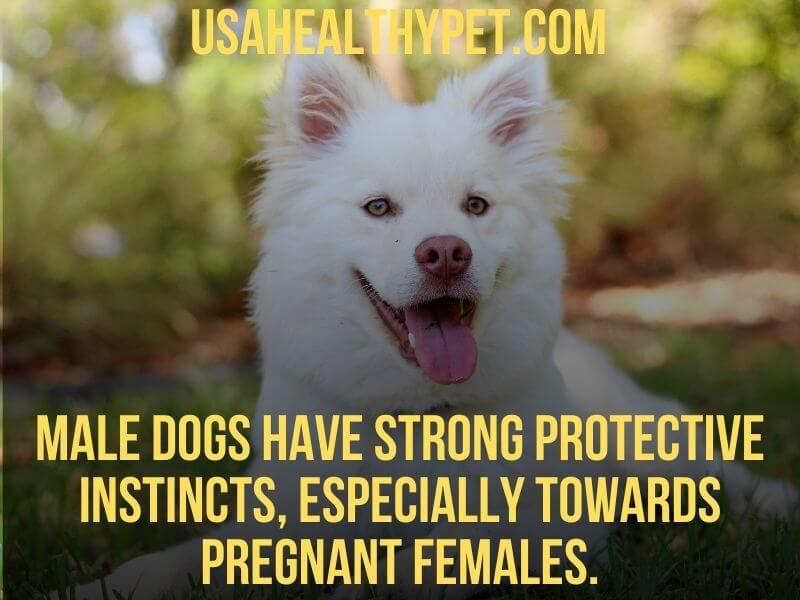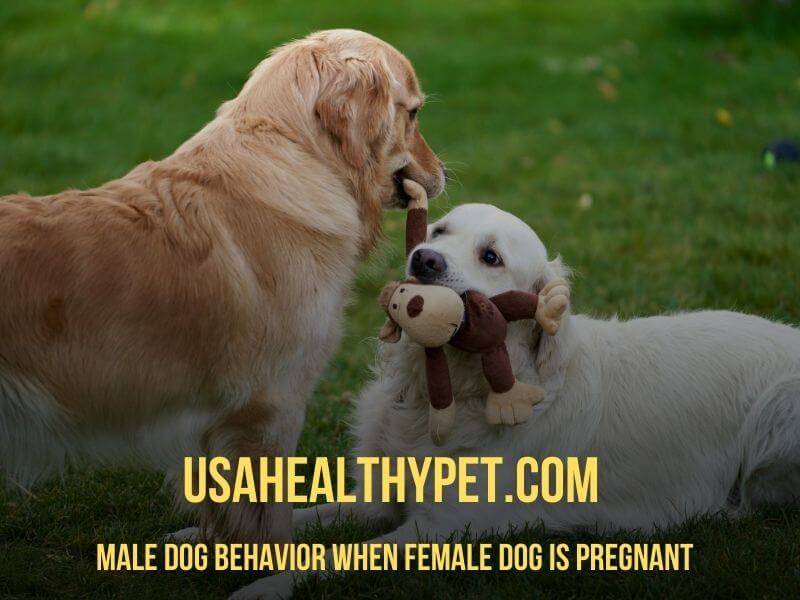Understanding your male dog’s behavior when your female dog is pregnant can be quite an adventure. Their actions can range from increased protectiveness to changes in their eating habits.
Let’s explore what you can expect and how to handle these behaviors to ensure a harmonious household.
- Understanding Canine Pregnancy
- Instinctual Behaviors in Male Dogs
- Increased Protective Instincts
- Changes in Play Behavior
- Altered Eating Habits
- Heightened Attention and Clinginess
- Increased Marking and Territorial Behavior
- Neutered Male Dog Behavior When Female is Pregnant
- Social Dynamics in Multi-Dog Households
- Behavior Towards the Pregnant Female
- Will Dogs Still Mate If the Female is Pregnant?
- Preparing for the Arrival of Puppies
- Post-Birth Behaviors
- Common Concerns and Solutions
- Training and Managing Behaviors
- Conclusion
Understanding Canine Pregnancy
Before we dive into the male dog’s behavior, it’s crucial to grasp the stages of a female dog’s pregnancy. Canine pregnancy typically lasts about 63 days, divided into three trimesters.
During this period, the pregnant female undergoes significant physical and hormonal changes. These changes affect her and can influence the behavior of male dogs around her.
Stages of Female Dog Pregnancy
- First Trimester: This is the early stage where you might not notice significant changes. The female may experience slight weight gain and mild behavioral changes.
- Second Trimester: Noticeable physical changes start to appear. The female’s abdomen enlarges, and her appetite increases. Behavioral changes become more pronounced.
- Third Trimester: The final stage where the female prepares for birth. Nesting behavior is common, and she may become more reclusive or protective.
Common Changes in Pregnant Females
- Increased Appetite: Pregnant females often eat more to support the growing puppies.
- Nesting Behavior: Seeking out quiet, safe places to prepare for birth.
- Mood Swings: Hormonal changes can lead to varying moods, from affectionate to irritable.
Instinctual Behaviors in Male Dogs
Male dogs often exhibit instinctual behaviors when they sense a female is pregnant. These behaviors are driven by natural instincts to protect and ensure the survival of their offspring.
| Behavior | Description | Reason |
|---|---|---|
| Increased Protectiveness | Guarding the pregnant female, staying close to her | Instinct to protect offspring |
| Changes in Play Behavior | More gentle play, reduced rough play | Sensitivity to pregnant female |
| Altered Eating Habits | Changes in appetite, competition for food | Stress or competition for resources |
| Heightened Attention | Seeking more attention from the owner | Changes in household dynamics |
| Increased Marking | Marking territory more frequently | Signaling protection of territory |
| Social Dynamics | More dominant behavior in multi-dog households | Protecting space and resources |
Natural Instincts and Protective Behaviors
Male dogs have strong protective instincts, especially towards pregnant females. This can manifest in various ways, including increased vigilance and aggression towards perceived threats.
Changes in Male Dog’s Behavior
Expect changes such as heightened alertness, guarding behaviors, and even alterations in their usual routines.
Increased Protective Instincts
One of the most noticeable changes in male dogs when a female is pregnant is their increased protective instincts.
Guarding the Pregnant Female
Your male dog may start guarding the pregnant female, staying close to her, and warding off any potential threats. This behavior is driven by the instinct to protect his future offspring.
Increased Alertness and Aggression
With the pregnant female around, the male dog might become more alert and, at times, aggressive. This heightened state of alertness ensures the safety of the pregnant female and the upcoming litter.

Changes in Play Behavior
Play behavior in male dogs can also change when a female is pregnant. They might become gentler and less playful.
Gentle Play vs. Rough Play
Male dogs may switch from rough play to more gentle interactions, sensing that the pregnant female needs to be treated carefully.
Reduced Playfulness
You might notice a general reduction in your male dog’s playfulness. He could be more focused on staying close to the female and ensuring her safety.
Altered Eating Habits
Changes in eating habits are another common behavior in male dogs during a female’s pregnancy.
Changes in Appetite and Feeding Behavior
Your male dog might experience a change in appetite. He may eat less due to stress or more to compete for resources.
Competition for Food
In multi-dog households, the male might compete for food more aggressively, driven by the instinct to ensure his own survival and that of his future puppies.
Heightened Attention and Clinginess
Male dogs often become more attentive and clingy when a female is pregnant.
Seeking Attention from the Owner
Your male dog may seek more attention from you, possibly due to the changes in the household dynamics.
Clinging to the Pregnant Female
He might also stick close to the pregnant female, providing her with companionship and protection.
Increased Marking and Territorial Behavior
Marking and territorial behaviors can escalate when a female is pregnant.
Marking Territory More Frequently
Male dogs may mark their territory more frequently, signaling to other animals that this space is protected.
Defending Space Against Other Animals
They may also be more aggressive towards other animals, defending their space to ensure the safety of the pregnant female and the upcoming litter.

Neutered Male Dog Behavior When Female is Pregnant
Neutered male dogs can also exhibit behavioral changes when a female is pregnant, though these changes might be less pronounced.
Reduced Hormonal Influence
Neutered males do not have the same levels of testosterone, which can lead to less aggressive and territorial behaviors.
Protective Instincts
Despite being neutered, many male dogs still exhibit protective behaviors towards a pregnant female, driven by their natural instincts.
Social Dynamics in Multi-Dog Households
In households with multiple dogs, the social dynamics can change significantly during a female’s pregnancy.
Interactions with Other Dogs
Male dogs might become more dominant or protective, influencing their interactions with other dogs in the household.
Maintaining Harmony
It’s important to monitor these interactions and intervene if necessary to maintain harmony and prevent conflicts.
Dr. Stanley Coren, a canine psychologist, highlights that “the social dynamics in multi-dog households can be significantly affected when a female is pregnant. Male dogs may exhibit dominant behaviors to protect their space and resources. It’s crucial to monitor these interactions closely and maintain harmony through positive reinforcement and proper management strategies.”
Behavior Towards the Pregnant Female
Male dogs can exhibit a range of behaviors towards the pregnant female, from gentle and nurturing to anxious and stressed.
Gentle and Nurturing Behavior
Some male dogs become more gentle and nurturing, providing comfort and companionship to the pregnant female.
Signs of Anxiety and Stress
Others may show signs of anxiety and stress, possibly due to the changes in their environment and the impending arrival of puppies.
Dr. Sarah Wilson, DVM, explains, “It’s quite common for male dogs to exhibit increased protectiveness and vigilance when a female in the household is pregnant. This behavior is rooted in their instincts to safeguard their future offspring. Owners should provide reassurance and maintain a stable environment to help their male dogs adjust.”
Will Dogs Still Mate If the Female is Pregnant?
Understanding mating behaviors in dogs during a female’s pregnancy is important for managing their interactions.
Mating Behavior and Pregnancy
Typically, a female dog will not be receptive to mating once she is pregnant. Her body undergoes hormonal changes that discourage further mating.
Male Dog’s Interest
However, male dogs may still show interest in the female due to residual hormonal cues. It’s important to monitor their interactions to prevent any undue stress on the pregnant female.
Preparing for the Arrival of Puppies
As the birth approaches, male dogs might display behaviors indicating their awareness of the upcoming event.
Nesting Behavior
While nesting is more common in females, some male dogs may also engage in nesting behaviors, helping to prepare a safe space for the puppies.
Male Dog’s Role in the Birthing Process
Although male dogs are usually not involved in the birthing process, their presence can provide comfort to the female. However, some females may prefer solitude during this time.
Post-Birth Behaviors
After the puppies are born, male dogs may exhibit various behaviors as they adjust to the new additions.
Reaction to Puppies
Male dogs’ reactions to puppies can vary widely, from curiosity and affection to indifference or even jealousy.
Helping with Puppy Care
In some cases, male dogs may assist in caring for the puppies, although this is less common.
Common Concerns and Solutions
There are common concerns that arise with male dogs during a female’s pregnancy, but there are effective solutions to manage these issues.
| Behavior Issue | Management Strategy |
|---|---|
| Aggression | Training, professional help if needed, consistent routine |
| Excessive Marking | Consistent routine, deterrents, exercise, mental stimulation |
| Changes in Appetite | Monitor eating habits, consult a vet if persistent |
| Clinginess and Attention | Provide reassurance, ensure attention is given, maintain normalcy |
| Social Dynamics Conflicts | Monitor interactions, intervene as needed, maintain harmony |
Dealing with Aggression
If your male dog becomes aggressive, it’s important to manage this behavior through training and, if necessary, seeking professional help.
Managing Excessive Marking
To manage excessive marking, consider implementing a consistent routine, using deterrents, and ensuring your male dog gets plenty of exercise and mental stimulation.
Training and Managing Behaviors
Proper training and management techniques can help ensure a smooth transition during the female’s pregnancy.
Positive Reinforcement Techniques
Use positive reinforcement to encourage desired behaviors in your male dog. Reward him for calm and gentle behavior around the pregnant female.
Dr. Emily Parker, a veterinary behaviorist, notes, “Positive reinforcement is key to managing your male dog’s behavior during a female’s pregnancy. Rewarding calm and appropriate behavior helps to reinforce those actions, making the transition smoother for everyone involved.”
Professional Training Tips
If you’re struggling to manage your male dog’s behavior, consider seeking advice from a professional trainer. They can provide tailored strategies to address specific issues.
Dr. Mark Evans, an animal behavior expert, adds, “Understanding the natural instincts of male dogs can help owners better manage their pets during a female’s pregnancy. Providing a consistent routine, ample exercise and mental stimulation can mitigate any negative impacts.”
Conclusion
Understanding and managing your male dog’s behavior during a female’s pregnancy is crucial for maintaining a harmonious household.
By recognizing the changes and employing effective strategies, you can help your male dog adjust smoothly to the new dynamics, ensuring a safe and supportive environment for the pregnant female and the upcoming puppies.

Pingback: Why Is My Dog's Poop Orange After Eating Chicken and Rice?
Pingback: Why Does My Dog Bark at Certain Dogs? Causes and Solutions